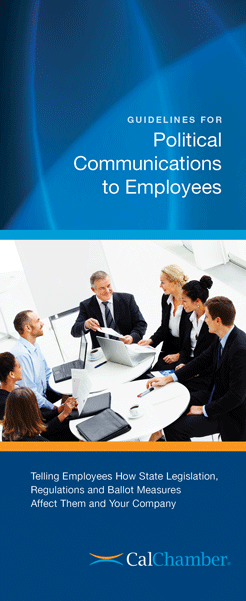A concise overview for employers about the do’s and don’ts of communicating with employees about ballot measures is available in an online brochure from the California Chamber of Commerce.
Early voting in California begins on October 8.
The brochure, “Guidelines for Political Communications to Employees,” points out that informing employees and stockholders about the impact of ballot measures (as well as proposed state legislation and regulations) is within the employer’s rights as a business owner—as long as the communication is done the right way.
Caution
The brochure emphasizes there should be NO PAYCHECK STUFFERS—employers cannot put any political messages in or on employees’ payroll envelopes.
Moreover, there should be no coercion, no rewarding or punishing employees for their political activities or beliefs (or threatening to do so).
Acceptable
Employers can communicate with their employees, stockholders and their families about the company’s support of or opposition to state legislation, regulations or ballot measures.
Also permissible is encouraging employees, stockholders and their families to support or oppose state legislation, regulations or ballot measures.
Political messages can be communicated to the business’s own employees and their families through such means as: internal mail systems (separate from payroll distribution), email systems, regular mail, bulletin boards, phone bank messages or employee meetings.
There is a distinction between the handling of internal communications (to employees, stockholders and their families) and external audiences (such as nonstockholder retirees, outside vendors, customers and passersby).
For more guidelines on political communications to employees, see the brochure at www.calchamber.com/guidelines. Two formats are available for download: an easy-to-print 8.5”x11” layout and one set up for printing on legal-size paper.


